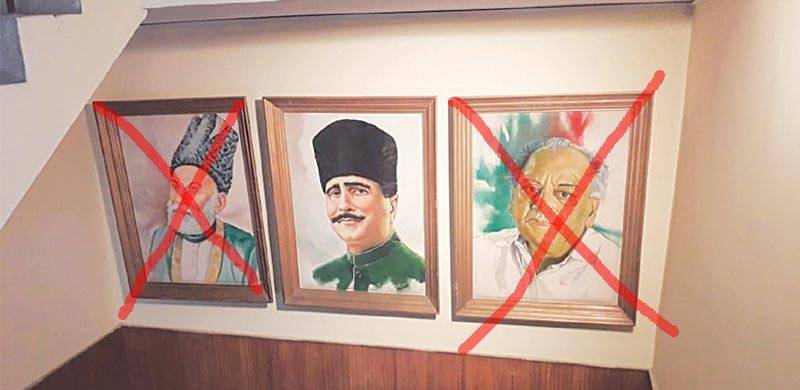
It seems that fragments of the old regressive mindset have survived and prospered in ‘Naya Pakistan’ as well after the new secretary of National History/Literary Heritage Nadeem Shafiq Malik ordered the removal of portraits of legendary Urdu poets Asadullah Khan Ghalib and Faiz Ahmed Faiz from the Pakistan Academy of Letters (PAL) on Friday.
The only portraits allowed to be displayed were those of Pakistan’s national poet Allama Muhammad Iqbal and founding father Muhammad Ali Jinnah.
Reportedly, Federal Minister for Education and Professional Training Shafqat Mahmood intervened after an uproar on social media in connection with this matter and put the portraits back where they belonged.
This is not the first incident where a government servant has attacked revered literary personalities who were unfortunate enough to be born among a nation of bigots.
If Nadeem Malik does not know who Faiz was and what role he played for promoting Pakistan’s art and culture, it is our duty to give him a brief lesson in history. In the not so distant past, Faiz recommended to then Prime Minister Zulfiqar Ali Bhutto to create institutions like PAL, the Pakistan National Council of Arts (PNCA), the National Institute of Folk and Cultural Heritage along with the National Book Foundation (NBF). In other words, the leftist poet was the founding father of these institutions.
After the rise of PTI to the status of the ruling party following the elections of 2018, the government and the civil-military establishment have joined hands to quash dissenting views promoted by civil rights groups and other members of the society. The space for alternate views in Pakistan has shrunk at a fast pace in the past one year.
The nationalistic discourse being promoted by the state for the past two decades has flourished to a level of its own, as is evident from violent attacks by extremist elements on the mausoleums and shrines of progressive peace-loving poets, intellectuals and Sufi saints. No corner of Pakistan has been spared by the attackers.
This does not mean that shrines of mystics in Punjab or Sindh remained unscathed in extremist attacks. The memory of bomb blasts at Data Darbar in Lahore, Sakhi Sarwar in Dera Ghazi Khan and Lal Shahbaz Qalandar in Sehwan Sharif, Sindh, are still fresh in the national memory.
The only portraits allowed to be displayed were those of Pakistan’s national poet Allama Muhammad Iqbal and founding father Muhammad Ali Jinnah.
According to eyewitnesses, the secretary told PAL staff that there was “no space for people like Ghalib and Faiz in Naya Pakistan”. He went the extra mile to stop his subordinates from even discussing this issue in hushed voices.
Reportedly, Federal Minister for Education and Professional Training Shafqat Mahmood intervened after an uproar on social media in connection with this matter and put the portraits back where they belonged.
This is not the first incident where a government servant has attacked revered literary personalities who were unfortunate enough to be born among a nation of bigots.
If Nadeem Malik does not know who Faiz was and what role he played for promoting Pakistan’s art and culture, it is our duty to give him a brief lesson in history. In the not so distant past, Faiz recommended to then Prime Minister Zulfiqar Ali Bhutto to create institutions like PAL, the Pakistan National Council of Arts (PNCA), the National Institute of Folk and Cultural Heritage along with the National Book Foundation (NBF). In other words, the leftist poet was the founding father of these institutions.
One should give credit to Shafqat Mahmood for his intervention and damage control initiative, but his actions do not absolve the present Pakistan Tehreek-e-Insaf (PTI) government from the crime of promoting hardline views at the expense of dissent and progressive ideals. In fact, these stains would be hard for them to remove for a long time to come.
After the rise of PTI to the status of the ruling party following the elections of 2018, the government and the civil-military establishment have joined hands to quash dissenting views promoted by civil rights groups and other members of the society. The space for alternate views in Pakistan has shrunk at a fast pace in the past one year.
The nationalistic discourse being promoted by the state for the past two decades has flourished to a level of its own, as is evident from violent attacks by extremist elements on the mausoleums and shrines of progressive peace-loving poets, intellectuals and Sufi saints. No corner of Pakistan has been spared by the attackers.
Rehman Baba, the national poet of Pukhtuns and regarded as the poet of peace, was not even spared in death after his mausoleum was bombed by Pakistani Taliban in 2009. Other mausoleums attacked in Pukhtun territories of Pakistan include those of renowned progressive Pukhtu poet Ajmal Khattak (2012 attack) and mystic Pukhtu poet Amir Hamza Shinwari.
This does not mean that shrines of mystics in Punjab or Sindh remained unscathed in extremist attacks. The memory of bomb blasts at Data Darbar in Lahore, Sakhi Sarwar in Dera Ghazi Khan and Lal Shahbaz Qalandar in Sehwan Sharif, Sindh, are still fresh in the national memory.
